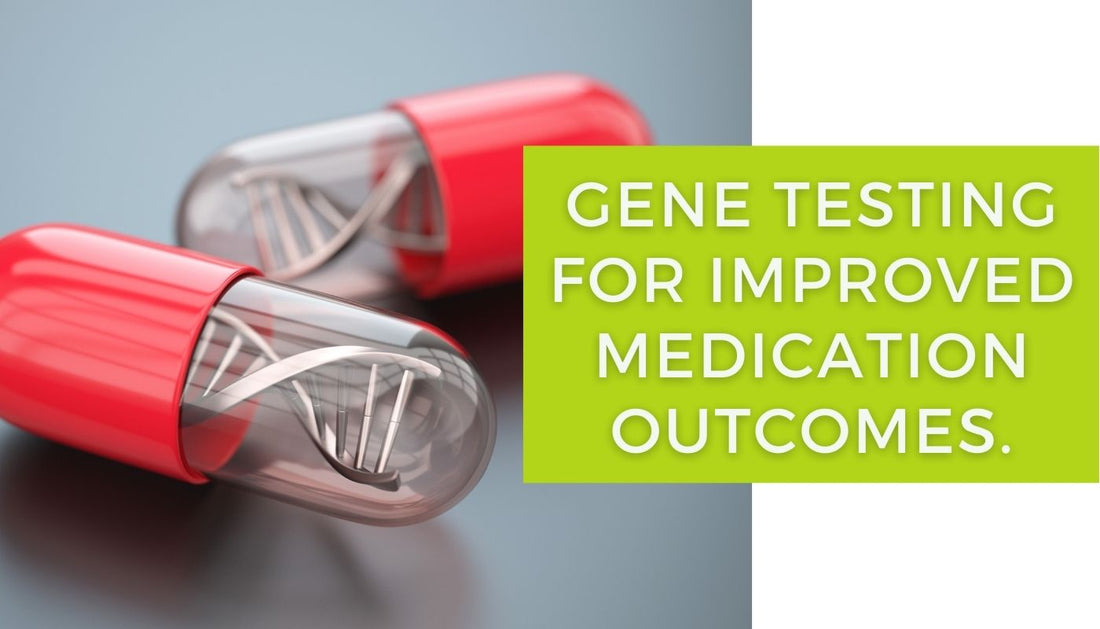
Q&A with our founder on how gene testing can improve medication metabolism
Share
Have you ever wondered why a certain medication seems to work well for your friend but not for you, even if you’re both experiencing the same condition?
A genetic test provides you with valuable insights into individual areas that should be considered for optimal health, including pharmacogenomics. We did a Q&A with our founder, Jean Brazendale, to help you understand what pharmacogenomics is and how it can improve your health.
What is pharmacogenomics?
Pharmacogenomics is the study of variances in your genetic code and how that affects the metabolism of the medications you may be taking. It helps to predict how fast or slowly your body may respond to certain medications, whether prescription or over the counter (OTC).
Why would you be interested in this test for you and your family?
This test can determine how effective or safe the medicine will be in the individual and predict likely side effects. An Adverse Drug Reaction (ADR) is when individuals react unfavourably to a medication and an alternative medication needs to be prescribed. Medications are developed with the idea that each medication will work the same on each user. Personalised prescription medication is the new approach, which is why it is important that the prescribing doctor and pharmacist need to know which medicines will work best for each patient.
Does anything else affect my prescription?
Other factors that may affect your medication prescription and how you respond to your medication include:
- Your age
- Your weight
- Your height
- Your kidney and liver function
- Other medications you may also be taking
How many times do I have to do my pharmacogenomics test?
Like other genetic tests, your genetic makeup does not change and you only need to do this test once. The test results are always available to refer to if you need to take OTC or prescribed medication.
Does my current medication affect my test results?
No, your current medication will not affect your test results as this test measures how your genes will react to certain medications and does not take into consideration the actual medication taken.
Medical genetic testing differs from pharmacogenomics
The results of medical genetic testing is different as it can confirm or exclude a suspected genetic condition or assist with determining an individual’s risk of developing or passing on a genetic disorder. For example BRCA1 gene variation for breast cancer risk. Medical genetic testing is usually accompanied with genetic counselling.
What are some examples of conditions tested for by medical genetic tests?
- Carrier screening for autosomal recessive conditions such as Tay Sachs or cystic fibrosis
- Down syndrome
- Family history of certain cancers (breast, ovarian and colon cancer)
What is genetic counselling?
Genetic counselling is based on medical genetic tests and provides individuals with information about genetic risks, benefits and limitations of genetic testing. The outcomes and management options are explored during the counselling session.
Genetic counsellors are trained healthcare professionals in the field of genetics and help to guide individuals on understanding the genetic test results and diagnosis as well as how these results will emotionally impact them and their family members. Genetic counsellors also provide support and guidance to assist family members by making informed decisions.
What can I expect from the genetic counselling consultation?
The genetic counsellor will discuss the following during the consultation:
- Your family medical history such as diagnosis of medical conditions and at what age.
- Cause, inheritance and risk of know genetic conditions in your family affecting future pregnancies and your family.
- Treatment options, management and preventative measures, if applicable.
- Offer the option of genetic testing where appropriate.
- Discuss the benefits and limitations of the genetic testing process.
- Address any ethical concerns and queries.
- Facilitation of the testing process with your referring doctor.
- Communication of results and provide supportive care for at risk family members.
To close off:
In this blog, Jean unpacked how genetic tests are changing the landscape when it comes to personalised health.
Personalised health is the future and it is available to us now through nutrigenomic tests.
At VitaGene we offer two brands of nutrigenomic tests.
3X4 Genetics has one test that includes 160 genes and 36 pathways to help you understand what your body’s unique needs are.
DNAlysis offers a range of DNA panels that cover a broad spectrum of health concerns or priorities which you can combine depending on your requirements.
The goal of both companies is to help you personalise your diet and lifestyle decisions for a longer, healthier and better life.
More information on these genetic tests can be found over here.
